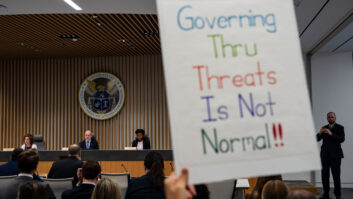There’s No Shortage of Suggestions On How to Retool the Commission
In the Nov. 17 issue we looked at one fairly radical proposal for changing the nature of the FCC. Now let’s consider some less dramatic but equally interesting alternatives for commission revision.
The first approach has been espoused chiefly by James C. Miller III, a veteran of the executive branch, having led both the Office of Management and Budget and the Federal Trade Commission at various points in his long career of government service. He now is chairman of the consulting firm CapAnalysis.
Miller feels that government regulation can be divided into two primary types: economic and social. He observes that the FCC currently engages in both types of regulation, and says this should change.
He and others assert that the FCC exercises considerable economic control, given that its jurisdiction affects multiple billions of dollars in assets and annual commerce, and he believes this was never a power that the commission was intended to have. Further, Miller thinks this level of power actually constrains the FCC from exercising its rightful duties, and that a smaller, less economically influential body would better serve the U.S. communication industry’s true regulatory needs.
(click thumbnail)
So Miller’s prescription for change calls for the FCC to cease its economic influence and perform only social regulation. This would redirect the agency to pure policy-making as initially chartered, and allow it to perform that role more freely and without the encumbrance of economic considerations. It also would eliminate the FCC’s ability to exercise what Miller characterizes as the power of taxation over an industry, which he feels is inappropriate.
As part of this process, Miller proposes that spectrum management would no longer be administered via a licensing process, but instead treated as real property. Initial grants of new spectrum via sale or auction could be handled by another branch of government – such as the General Services Administration or the OMB, as Dick Wylie recommended during his tenure as FCC chairman – and transfer of existing rights to spectrum usage would proceed in an open marketplace. Enforcement and prosecution of regulatory violations would remain under the FCC in Miller’s view, as part of the agency’s continuing social jurisdiction.
Miller believes that the FCC also could be made more efficient by subjecting it to oversight by the U.S. Office of Information and Regulatory Affairs, which exercises a review of cost-effectiveness of other federal regulatory bodies, but not the FCC. (None of the so-called independent agencies of the federal government, described in the previous column, are subject to such review under current law.)
Evolution not revolution
Perhaps the most realistic approach to FCC reform is one in which smaller and more focused internal changes are adopted. This is a view held by numerous observers, including former commissioners, although not all agree on the particular components of such change.
For example, in recent presentations, former FCC Commissioner Susan Ness reacts to some of the more radical reform proposals with strong countering arguments. Regarding the idea that the FCC should no longer be an independent agency, Ness believes that the communications industry today is less like the transportation industries – which have been so deregulated – and more like financial markets, which continue to be regulated by the SEC, an independent agency. She feels that allowing overt politicization of telecom regulation would be dangerous, particularly at a time of such strong polarization of the electorate.
Further, given the increasingly high stakes within the private sector of the economy under FCC jurisdiction, Ness asks if it is really desirable to have potential mood swings in the regulatory environment on a potentially quadrennial basis. She also is dubious of the depoliticized carve-out that Randolph May proposes for adjudication efforts, described last issue, feeling that it would be difficult to avoid the intrusion of politics into this area as well.
Ness believes that the current structure of five commissioners provides the proper balance between expediency and fairness, although she acknowledges that governance processes could be improved (e.g., why subject an already sitting commissioner to reconfirmation for an appointment as a new chair of the commission?).
In contrast to how some have painted the FCC’s recent record, Ness cites many examples of contemporary regulation that were developed quickly, have provided effective, needed results and remain unchallenged. She feels that adequate political accountability exists in current practice, and when exceptionally broad public policy issues come up, that congressional and/or judicial review is rightly invoked – e.g., media ownership and the analog TV shutoff.
Another possible outcome of reduced federal jurisdiction might be the establishment of increased state telecom regulation, Ness believes, which is likely not in broadcasters’ interest – particularly in today’s highly consolidated national marketplace.
Instead, Ness advocates internal restructuring of the commission, perhaps along functional lines rather than the current bureau-based organization. This could minimize the “stovepipe thinking” that often drives vertical decision making within each bureau, and it might also improve efficiencies across the commission by avoiding unnecessary duplications of effort.
The FCC’s harshest critics also condemn its recent growth, and are particularly rankled by how much of it has taken place since the Telecom Act of 1996, allegedly a deregulatory statute. Ness and others counter that at least some of this expansion is justified nonetheless, given the explosive growth of new telecom markets, and the requirements for the FCC to address wholly new areas of regulation (e.g., recent action in the broadband-over-power-lines area).
If there was a Vegas line on this issue, it would probably favor the small changes proposed by Ness and other insiders over the more extreme changes being discussed. Yet something along the latter lines is not unheard of in Washington, and the FCC has increasingly been a source of negative attention there recently. The arena of telecom regulation could be ripe for change, and it may be sweeping.








